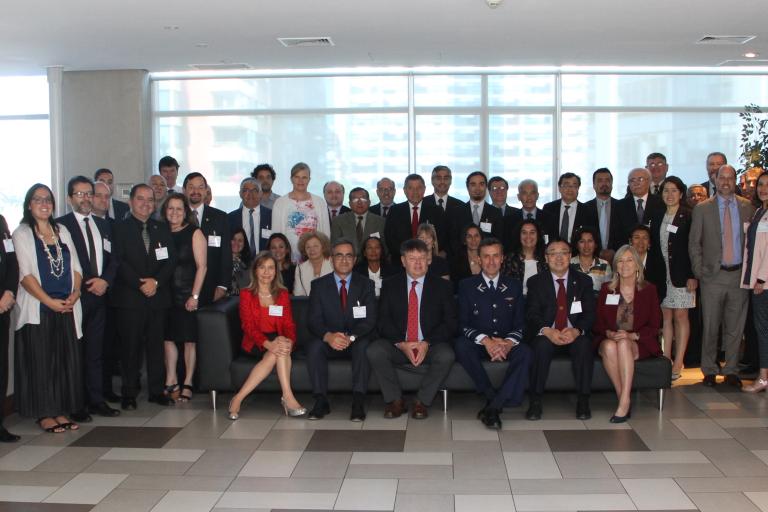Regional Association for South America meets
WMO’s Regional Association for South America (RAIII) has agreed on key priorities to improve infrastructure and strengthen capacity of National Meteorological and Hydrological Services (NMHSs) to deliver high impact weather, water and climate services. These are necessary to promote disaster resilience and climate change adaptation in a region which has witnessed severe drought and devastating floods in recent years.

WMO’s Regional Association for South America (RAIII) has agreed on key priorities to improve infrastructure and strengthen capacity of National Meteorological and Hydrological Services (NMHSs) to deliver high impact weather, water and climate services. These are necessary to promote disaster resilience and climate change adaptation in a region which has witnessed severe drought and devastating floods in recent years.
The Deputy Director of the Directorate-General of Civil Aviation Rafael Carrere met with WMO Secretary-General Petteri Taalas and Regional Association President, Guillermo E. Navarro for discussions underlining the importance of meteorological and hydrological services in protecting life and property and supporting sustainable development in a country dependent on hydro-electric power and other natural resources. Chile hosted the session in Santiago from 20-23 November.
“In the current and future context of climate change, the provision of effective climate services for decision-making will be a long-standing priority for our Organization,” WMO Secretary-General Taalas told the opening ceremony.
“All over the world, climate change is negatively affecting a number of infectious diseases and environmental issues, from malaria or dengue fever to heat stress or air pollution. The demand for climate services targeting the health community is clear. Equally clear is the need for a more coordinated approach, involving national agencies dealing with public health, the environment, and meteorology,” said Mr Taalas.
South America has witnessed a number of extreme weather events this year, including floods, drought and high temperatures. The region is exposed to natural climate variability caused by phenomenon such as El Niño/La Niña events and to human-induced climate change which is leading to more heat-waves, heavy precipitation, the retreat of glaciers in the Andes and the harmful impact of ocean acidification on marine life.
These require a holistic and collaborative approach, inter alia through strengthened public-private collaboration as well as improved collaboration across the public sectors, for example, for promoting integrated land and water management at watershed or river basin scale for effective climate adaptation, drought and flood risk management and related policy development.
A Regional Conference (RECO) was held over the 2 days prior to the RA III session. It was an open space for reflection and debate in which Permanent Representatives of national meteorological services met with invited experts from regional and international organizations such as the World Bank, Food and Agriculture Organization, UNESCO and development partners including the USA, Spain, France and Switzerland to identify challenges and regional priorities and actions.
At the meeting, the 13-Member Regional Association adopted its Strategic Plan for 2020-2023 and also for the first time a Gender Action Plan. This is a first for a WMO Regional Association.
It said special attention should be given to implementing WMO’s Integrated Global Observing System and the WMO Information System, which will make it easier to provide, store, access, exchange and interpret meteorological observations.
Other key priorities included improving impact-based forecasts and early warnings of extreme meteorological, hydrological and climatic events, implementing them through the Common Alerting Protocol system in all Member countries and harmonizing them to contribute with meteorological and hydrological warnings to the WMO Global Multi-hazard Alert System (GMAS).
Strengthening capacity of NMHSs, and implementation of the Global Framework for Climate Services through the respective National Climate Services Frameworks (NFCS) and the Regional Climate Centres with an aim to increase user-driven climate services such as seasonal climate outlooks and drought monitoring, especially for the food security, water management, health and disaster risk reduction sectors were also major priorities.
A pressing need for to improve hydrological services in the region that support the entire value chain and in an articulated manner among National Meteorological Services, National Hydrological Services, and other water-related institutions.
There was also a strong desire to initiate relevant actions and dialogue to achieve the implementation of a Meteorological Satellite programme for the Region suitable for the monitoring of extreme events, within the framework of strengthening the observational capacities.
Mr Guillermo E. Navarro (Chile) was elected as President and Madeleine Renom (Uruguay) as Vice-President. WMO has six regional associations, which meet every four years.

